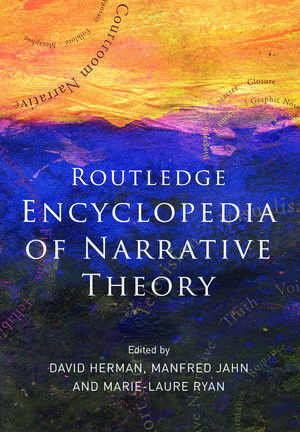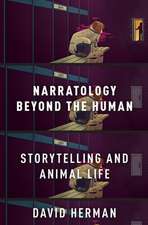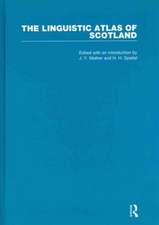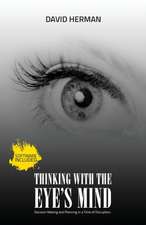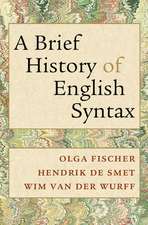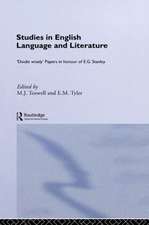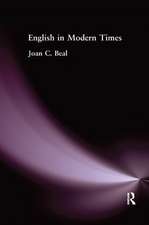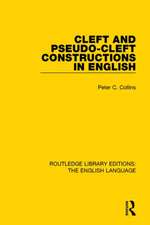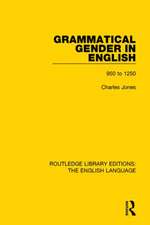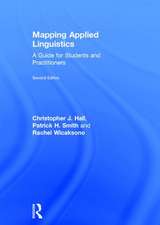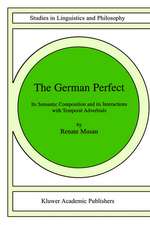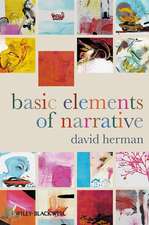Routledge Encyclopedia of Narrative Theory
Editat de David Herman, Manfred Jahn, Marie-Laure Ryanen Limba Engleză Paperback – 7 sep 2007
In addition to providing ample coverage of structuralist models and of the frameworks developed for the study of literary narratives, this reference also seeks to give a broad overview of paradigms for analyzing stories across a variety of media and genres ߝ from film, television, opera, and digital environments, to gossip, sports broadcasts, comics and graphic novels, obituaries, and many more. The entries cover the history of the field, key terms and concepts, various schools and approaches, important debates, and a wide range of disciplinary contexts related to the field.
Featuring extensive cross-references and suggestions for further reading, this Encyclopedia is invaluable for students and researchers in many fields, from literary studies, gender studies, and philosophy, to cognitive and social psychology, media studies, Artificial Intelligence, and the study of organizations, medicine, jurisprudence, and history.
Key features include:
* comprehensive and truly interdisciplinary coverage, examining narrative issues across disciplines, media, genres, and cultural contexts
* written by an international team of over 200 experts in from all over the world
* extensively cross-referenced and indexed
* authoritative and up-to-date bibliographies and suggestions for further reading.
| Toate formatele și edițiile | Preț | Express |
|---|---|---|
| Paperback (1) | 427.34 lei 3-5 săpt. | +53.97 lei 4-10 zile |
| Taylor & Francis – 7 sep 2007 | 427.34 lei 3-5 săpt. | +53.97 lei 4-10 zile |
| Hardback (1) | 1257.11 lei 6-8 săpt. | |
| Taylor & Francis – 21 dec 2004 | 1257.11 lei 6-8 săpt. |
Preț: 427.34 lei
Preț vechi: 464.50 lei
-8% Nou
81.78€ • 85.07$ • 67.52£
Carte disponibilă
Livrare economică 25 martie-08 aprilie
Livrare express 08-14 martie pentru 63.96 lei
Specificații
ISBN-10: 0415775124
Pagini: 752
Dimensiuni: 174 x 246 x 43 mm
Greutate: 1.39 kg
Ediția:1
Editura: Taylor & Francis
Colecția Routledge
Locul publicării:Oxford, United Kingdom
Public țintă
Postgraduate and UndergraduateCuprins
actant; action theory; adaptation; address; addresser and addressee; adolescent narrative; advertisements; African narrative; agency; allegory; alteration; alterity; anachrony; analepsis; ancient theories of narrative (Western); ancient theories of narrative (non-Western); anecdote; animated film; annals; anti-narrative; apology; archetypal patterns; architext; Artificial Intelligence and narrative; atomic and molecular narratives; attributive discourse; audience; Australian Aboriginal narrative; authentication; author; authorial narrative situation; autobiography; autodiegetic narration; autofiction; backstory; ballad; Biblical narrative; Bildungsroman; biography; biological foundations of narrative; blog (weblog); catachresis; catharsis; causality; character; Chicago school; children's stories (narratives written for children); children's storytelling; Chinese narrative; chronicle; chronotope; cinéroman; closure; codes for reading; cognitive narratology; coincidence; comics and graphic novel; coming-out story; commentary; communication in narrative; communication studies and narrative; composite novel; computational approaches to narrative; computer games and narrative; concretisation; confessional narrative; conflict; Constance school; contextualism (in historiography); conversational storytelling; counterfactual history; courtroom narrative; cultural-studies approaches to narrative; cyberpunk fiction; dance and narrative; deconstructive approaches to narrative; defamiliarisation; deixis; denarration; description; desire; detective fiction; dialogism; dialogue in the novel; diary; didactic narrative; diegesis; digital narrative; discourse analysis (Foucault); discourse analysis (linguistics); disnarrated, the; distance; drama and narrative; dramatic irony; dramatic monologue; dramatic situations; dream narrative; dual-voice hypothesis; dystopian fiction; eco-narratives; écriture féminine; education and narrative; ekphrasis; embedding; emic and etic; emotion and narrative; emplotment; encyclopedic novel; epic; epiphany; episode; epistolary novel; ergodic literature; ethical turn; ethnographic approaches to narrative; events and event-types; evolution of narrative forms; existent; experiencing-I; experientiality; exposition; extradiegetic narrator; fable; fabula; fairy tale; family chronicle; fantastic, the; fantasy; feminist narratology; fiction, theories of; Figura (Auerbach); figural narration; film narrative; first-person narration; focalization; folklore; folktale; foregrounding; formalism; frame theory; framed narrative; free indirect discourse; frequency; Freytag's triangle; function (Jakobson); function (Propp); gapping; gaze; gender studies; genealogy; genre fiction; genre theory in film studies; genre theory in narrative studies; gesture; gossip; Gothic novel; grand récit; graphic presentation as expressive device; hagiography; hermeneutics; hero; heterodiegetic narration; heteroglossia; historical novel; historical present; historicis; historiographic metafiction; historiographic narratology; historiography; Holocaust narrative; homodiegetic narration; horizon of expectations; horror narrative; humour studies and narrative; hybrid genres; hybridity; hypertext; hypertext and hypotext (Genette); hypodiegetic narrative; identity and narrative; ideology and narrative; image and narrative; immersion; implied author; implied reader; in medias res; indeterminacy; institutional narrative; intentionality; interactive fiction; interactivity; interdisciplinary approaches to narrative; interior monologue; intermediality; intertextuality; intradiegetic narrator; irony; isotopy; Japanese narrative; joke; journalism; law and narrative; legal fiction; legend; leitmotif; letters as narrative; life story; linguistic approaches to narrative; logic of narrative; magical realism; Marxist approaches to narrative; master narrative; media and narrative; mediacy; medicine and narrative; medieval narrative; memory; mental mapping of nar
Notă biografică
Recenzii
'The Routledge Encyclopedia of Narrtive Theory is an extraordinarily useful compilation of narratological knowledge that not only lives up to the ambitious title but exceeds its scope' - Sabine Gross, Personalia
'Potentially daunting, this complex subject is made a snap by clever arrangements for entries: five different types, from mini-essay to thumbnail definition, all cross-indexed. The helpful navigational aids include coded typeface, a thematically-organized reader's guide, and an excellent comprehensive index. Thorough, accessible, and remarkably free of obfuscating language. Highly recommended.'– Choice
'It is the single volume I would advise my students and other budding narratologists to purchase so as to have it constantly at hand for quick consultation...With its more than 700 tightly packed pages, close to 450 entries by 200 international experts on narrative-theoretical topics, plus an 80-page index, the Encyclopedia is well worth the investment.' - Pekka Tammi, Language and Literature 16:4 (2007)
'Potentially daunting, this complex subject is made a snap by clever arrangements for entries: five different types, from mini-essay to thumbnail definition, all cross-indexed. The helpful navigational aids include coded typeface, a thematically-organized reader's guide, and an excellent comprehensive index. Thorough, accessible, and remarkably free of obfuscating language. Highly recommended.' - Choice 'The Routledge Encyclopedia of Narrtive Theory is an extraordinarily useful compilation of narratological knowledge that not only lives up to the ambitious title but exceeds its scope' - Sabine Gross, Personalia
Descriere
The increasing interest in narrative theory as a focus of inquiry across multiple disciplines makes it imperative for scholars, teachers, and students to have access to an in-depth reference that cuts across disciplinary specializations to provide information about the core concepts, categories, distinctions, and technical nomenclatures that have grown up around the study of narrative in all of its guises. The Routledge Encyclopedia of Narrative Theory answers that need, providing a comprehensive and authoritative resource for students and researchers in the many disciplines drawing on concepts of storytelling and using methods of narrative analysis.
In addition to providing ample coverage of structuralist models and of the frameworks developed for the study of literary narratives, this reference also seeks to give a broad overview of paradigms for analyzing stories across a variety of media and genres ߝ from film, television, opera, and digital environments, to gossip, sports broadcasts, comics and graphic novels, obituaries, and many more. The entries cover the history of the field, key terms and concepts, various schools and approaches, important debates, and a wide range of disciplinary contexts related to the field.
Featuring extensive cross-references and suggestions for further reading, this Encyclopedia is invaluable for students and researchers in many fields, from literary studies, gender studies, and philosophy, to cognitive and social psychology, media studies, Artificial Intelligence, and the study of organizations, medicine, jurisprudence, and history.
Key features include:
* comprehensive and truly interdisciplinary coverage, examining narrative issues across disciplines, media, genres, and cultural contexts
* written by an international team of over 200 experts in from all over the world
* extensively cross-referenced and indexed
* authoritative and up-to-date bibliographies and suggestions for further reading.
